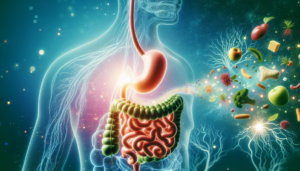The Role of Fiber in Maintaining a Healthy Gut
The Role of Fiber in Maintaining a Healthy Gut
Understanding Fiber
Fiber is a type of carbohydrate that the human body cannot digest. Unlike other carbohydrates that are broken down and absorbed in the digestive tract, fiber passes through the intestines relatively intact. There are two primary types of dietary fiber: soluble and insoluble fiber, each serving distinct roles in gut health.
Soluble Fiber
Soluble fiber dissolves in water to form a gel-like substance. It is found in foods such as oats, legumes, apples, and citrus fruits. This type of fiber is beneficial for cholesterol management, helping lower blood cholesterol levels while also regulating blood sugar, which is particularly important for individuals with diabetes.
Insoluble Fiber
Insoluble fiber does not dissolve in water and adds bulk to the stool, making it easier to pass. It is found in whole grains, nuts, seeds, and vegetables such as carrots and celery. This type of fiber plays a critical role in promoting regular bowel movements and preventing constipation.
Mechanisms of Action
Enhancing Gut Transit Time
Fiber enhances gut motility by adding bulk to the stool and stimulating the intestines’ muscular contractions, a process known as peristalsis. This promotes regularity, ensuring that waste is excreted efficiently from the body. Regular bowel movements help prevent conditions such as constipation and diverticular disease.
Fermentation and Short-Chain Fatty Acid Production
Soluble fiber acts as a prebiotic, serving as a food source for beneficial gut bacteria. When gut bacteria ferment soluble fiber, they produce short-chain fatty acids (SCFAs) such as acetate, propionate, and butyrate. SCFAs play a crucial role in gut health by providing energy to colon cells, supporting their growth and maintenance, and maintaining overall gut integrity.
Balancing Gut Microbiota
A healthy gut microbiome is crucial for optimal health, and fiber plays a significant role in maintaining this balance. Diverse fiber sources encourage a varied microbiome, which is essential for digestion, immune function, and even mental health. Consuming a variety of fibers helps foster different types of beneficial bacteria, improving gut health.
Health Benefits of Dietary Fiber
Improved Digestive Health
Fiber is essential in preventing common digestive issues such as constipation, hemorrhoids, and irritable bowel syndrome (IBS). By ensuring that waste is excreted regularly, fiber reduces the risk of developing gastrointestinal disorders. Furthermore, its ability to nourish beneficial bacteria helps maintain a balanced gut microbiome.
Weight Management
High-fiber foods are typically low in calories but high in volume, meaning they can help create a feeling of fullness, leading to reduced overall calorie intake. Additionally, fiber slows the digestion process, preventing rapid spikes in blood sugar and promoting stable energy levels. This translates into better appetite control and weight management.
Reduced Risk of Chronic Diseases
Fiber intake has been linked to a lower risk of several chronic diseases, including heart disease, type 2 diabetes, and certain types of cancer. Soluble fiber helps lower cholesterol levels, reducing the risk of heart disease, while the anti-inflammatory properties of SCFAs produced from fiber fermentation may help lower the risk of colorectal cancer.
Enhanced Immune Function
A healthy gut houses a significant portion of the body’s immune system. A well-balanced gut microbiome, supported by adequate fiber intake, can enhance immune function and decrease susceptibility to infections and diseases. Fiber’s role in producing SCFAs also contributes to anti-inflammatory responses, helping the body combat chronic inflammation.
Recommended Daily Fiber Intake
The recommended daily fiber intake varies by age and sex. According to the Institute of Medicine, adult women should aim for 25 grams per day, while men should strive for 38 grams. However, many people fall short of these targets, potentially missing out on the numerous health benefits associated with adequate fiber consumption.
Sources of Dietary Fiber
To incorporate more fiber into your diet, consider the following food sources:
Fruits
- Apples: Rich in soluble fiber, especially in the skin.
- Bananas: Contain both soluble and insoluble fiber and are also a good source of potassium.
- Berries: Such as raspberries and blackberries are particularly high in fiber and antioxidants.
Vegetables
- Broccoli: A cruciferous vegetable high in both fiber and vitamins.
- Carrots: Excellent source of insoluble fiber that also supports eye health.
- Brussels sprouts: High in fiber, vitamins, and other nutrients that contribute to gut health.
Whole Grains
- Oats: High in soluble fiber called beta-glucan, which is beneficial for heart health.
- Quinoa: A complete protein source that’s also high in fiber.
- Whole wheat products: Such as bread and pasta provide substantial amounts of insoluble fiber.
Legumes
- Lentils: High in both fiber and protein, making them an excellent choice for gut health.
- Chickpeas: Contain fiber and essential vitamins and minerals.
- Kidney beans: A source of protein and fiber that helps maintain digestive health.
Nuts and Seeds
- Chia seeds: Extremely high in soluble fiber and omega-3 fatty acids.
- Almonds: Rich in fiber and healthy fats that support gut health.
- Flaxseeds: Contain both soluble and insoluble fiber, along with omega-3s.
Strategies for Increasing Fiber Intake
Increasing fiber intake should be a gradual process to avoid digestive discomfort. Here are some strategies:
Start Slow
Increase fiber consumption gradually over several days to give your digestive system time to adjust. A sudden increase may lead to bloating or gas.
Incorporate Fiber-Rich Foods into Every Meal
Aim to include a source of fiber in each meal. For breakfast, add fruits or whole grains; for lunch and dinner, prioritize vegetables and legumes.
Snack Wisely
Choose fiber-rich snacks like fruits, vegetables, and nuts. They provide energy while promoting digestive health.
Stay Hydrated
Increasing fiber necessitates adequate hydration. Drink plenty of water to assist in digestive processes and help fiber function effectively in the gut.
Conclusion
Understanding the role of fiber in maintaining a healthy gut is vital for overall health and well-being. Without it, many individuals may experience digestive issues, weight management challenges, and increased risk of chronic diseases. Incorporating a diverse range of high-fiber foods into the diet, while staying hydrated, can significantly enhance gut health and contribute to a better quality of life. Balancing soluble and insoluble fiber, and creating a varied and colorful plate, is essential for reaping the numerous benefits fiber has to offer.








